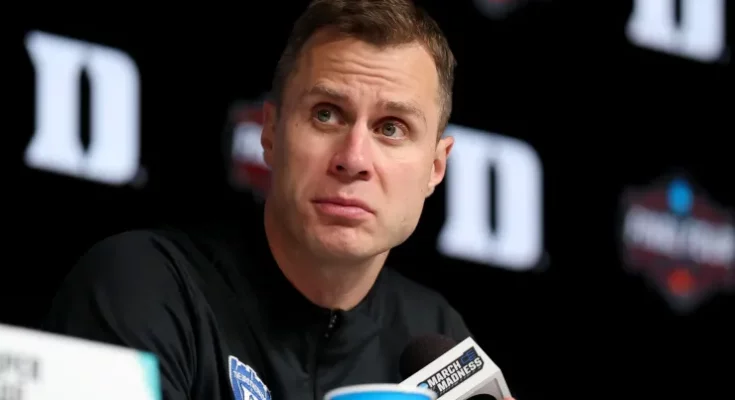In the world of college basketball, few programs command as much attention and scrutiny as Duke University. Known for its storied history, elite recruiting, and the legendary tenure of Coach Mike Krzyzewski, the Blue Devils are often under the microscope when it comes to coaching decisions and team performance. As the program moves into a new era following Coach K’s retirement, Jon Scheyer, a former Duke player and assistant coach, has stepped into the spotlight as the new head coach. Recently, a prominent basketball analyst made a bold prediction about Jon Scheyer’s future at Duke, sparking widespread discussion across college basketball circles.
This prediction is not just a casual remark but a well-considered evaluation of Scheyer’s potential impact on the program. The analyst, known for his deep knowledge of college basketball dynamics and coaching trends, forecasted that Jon Scheyer will not only maintain Duke’s status as a top-tier program but will also elevate it to unprecedented heights. According to the analyst, Scheyer’s combination of playing experience, coaching acumen, and recruitment savvy will position him as one of the most successful coaches in Duke history, potentially rivaling or even surpassing some of the accomplishments of Coach K himself.
To understand the weight of this prediction, it is essential to explore the context surrounding Jon Scheyer’s appointment and the challenges he faces. Scheyer is a Duke alumnus who played under Coach K, leading the Blue Devils to a national championship in 2010. His deep connection to the program and understanding of its culture are often cited as key assets. After his playing career, which included a stint overseas, Scheyer returned to Duke as an assistant coach, where he played a crucial role in recruiting and player development. This internal promotion to head coach reflects the university’s confidence in his ability to uphold the program’s values and competitive edge.
The analyst emphasized Scheyer’s unique perspective as both a former player and a coach. This dual experience gives him a rare insight into what it takes to succeed at Duke. Having walked the same path as his players, Scheyer can relate to their aspirations and pressures, fostering a mentorship environment grounded in empathy and high expectations. Moreover, his recent coaching experience means he is familiar with the evolving landscape of college basketball, including the increasing influence of NIL (Name, Image, Likeness) deals, transfer portal dynamics, and the shifting recruitment strategies necessary to attract top talent.
One of the main pillars of Scheyer’s predicted success is his proven recruitment prowess. As an assistant, he was instrumental in landing several highly rated recruiting classes, helping Duke secure top prospects year after year. The analyst believes that Scheyer’s personal connection to the program and his ability to communicate a compelling vision for the future will resonate with recruits, enabling Duke to continue attracting elite players. In an era where top high school prospects have more options than ever before, maintaining recruiting dominance is critical, and Scheyer’s track record suggests he is well-equipped to meet this challenge.
Furthermore, the analyst highlighted Scheyer’s strategic approach to coaching. Unlike some who rely heavily on traditional methods, Scheyer is described as a forward-thinking coach who embraces innovation. This includes integrating advanced analytics into game planning, adapting defensive schemes to counter contemporary offensive trends, and emphasizing player versatility. His understanding of the modern game’s nuances could give Duke an edge in competitive matchups, especially against other top programs that are also evolving rapidly.
Another significant factor contributing to the analyst’s bold prediction is Scheyer’s leadership style. He is known for fostering a team culture that balances discipline with camaraderie, emphasizing accountability while nurturing player growth. This approach aligns well with Duke’s historical emphasis on character development alongside athletic excellence. The analyst suggested that Scheyer’s leadership will not only create winning teams but also cultivate players who thrive both on and off the court, enhancing Duke’s reputation as a holistic development hub.
The prediction also considered the broader landscape of college basketball coaching. Scheyer represents a new generation of head coaches who have come through the ranks as players and assistants under legendary mentors. This trend suggests a continuity of coaching philosophies combined with fresh perspectives, potentially allowing programs like Duke to evolve without losing their identity. The analyst proposed that if Scheyer successfully navigates this balance, he could establish a coaching legacy that cements Duke’s relevance for decades to come.
While the analyst’s prediction is optimistic, it does not overlook the inherent challenges. Taking over a program with the expectations that come with Duke’s name is no small feat. Scheyer will face pressure to produce immediate results, manage high-profile recruits, and sustain the intense media scrutiny that follows the Blue Devils. Additionally, the changing rules around player compensation and transfer policies add layers of complexity to roster management. However, the analyst remains confident that Scheyer’s background and skills position him well to address these obstacles.
An essential aspect of the prediction involves Scheyer’s potential to adapt Duke’s style of play to the evolving college basketball environment. The analyst noted that while Duke has historically been known for its fast-paced, high-scoring offense and relentless defense, modern basketball requires flexibility and innovation. Scheyer’s ability to incorporate a more positionless approach and leverage players’ unique skill sets could result in a team that is more unpredictable and difficult to defend. This tactical evolution could be key to sustaining Duke’s success against a growing number of competitive programs.
The analyst also speculated about Scheyer’s future beyond Duke. Should he achieve early success, there is a possibility he could become one of the most influential figures in college basketball coaching. His trajectory might include national championships, coach of the year honors, and potentially mentoring future coaches who carry forward his philosophies. This kind of legacy-building is rare and would be significant not only for Duke but for the sport at large.
Another point raised in the prediction is Scheyer’s ability to engage with the Duke fanbase and alumni network. Maintaining strong relationships with supporters is vital for fundraising, facilities improvements, and program stability. Scheyer’s status as a beloved former player enhances his credibility and connection to these stakeholders, potentially facilitating a smoother transition and stronger institutional support. The analyst suggested that this rapport could give Scheyer an advantage in building a sustainable program culture.
In addition to internal program dynamics, the analyst considered the competitive environment of the Atlantic Coast Conference (ACC) and the broader NCAA landscape. Duke’s main rivals, including North Carolina, Virginia, and Louisville, continue to be strong contenders, and the rise of mid-major programs adds further competition. The analyst predicted that Scheyer’s strategic mindset and recruiting skill set would allow Duke to maintain its edge in the ACC and remain a perennial contender in the national tournament.
The analyst’s prediction has already stirred conversations among Duke fans, players, and the college basketball community. Some view it as a vote of confidence in Scheyer’s abilities, while others approach it with cautious optimism, recognizing the challenges ahead. Regardless, the prediction underscores the high expectations placed on Scheyer and highlights the excitement surrounding Duke’s future.



